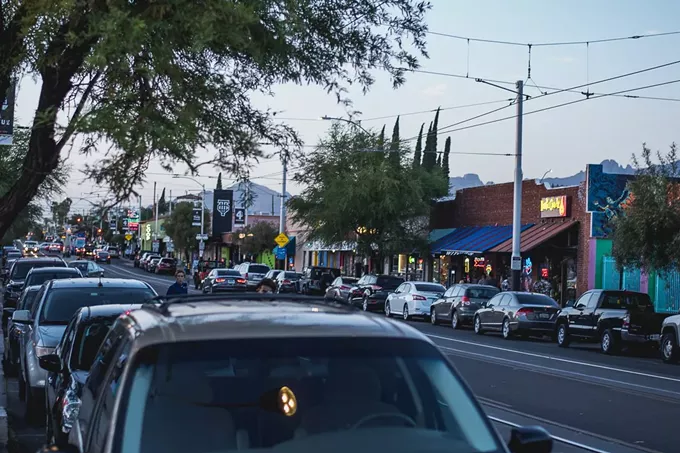Wednesday, March 28, 2018
Here's How To Preserve Local Ownership on Fourth Avenue
Local First Arizona is working with the Fourth Avenue Merchants Association on a forum planned for March 30 to discuss potential legislative and policy solutions to promote localist ownership opportunities for Historic Fourth Avenue and the Tucson community.
This community forum is in response to the planned Union on 6th project, which is a seven-story apartment building with ground floor retail space under contract with Education Realty Trust Inc. (EdR), a student-housing development company based in Memphis. The development will be where the local Flycatcher nightclub currently exists. The area that EDR has under contract stretches west from the corner of Fourth Avenue and Sixth Street to Fifth Avenue. Their proposed new development is planned in the Infill Incentive District (IID), which was created to encourage more urban planning projects using development incentives and heightened flexibility.
Local First Arizona is most concerned that this project will be the tipping point for a larger trend of apartments where locally owned businesses once stood, and the new norm of chain stores in new developments populating an area that has been the hub of local businesses in Tucson. The multi-layered negative effect here could be the loss of the distinctive identity of Fourth Avenue, which would lead to a decline in customers for the locally owned businesses that reside on the avenue and make it a top destination in the city. As the City of Tempe, our neighbors to the north, invited more chains to their thriving downtown decades ago, the sales tax revenue dropped steadily for 27 months. The distinct issue to address with this development is how to best preserve locally owned independent businesses which retain up to four times more money in our communities than their national chain counterparts.
The following is a list of priorities that Local First Arizona and the Fourth Avenue Merchants Association are advocating for the Union on 6th developers and City of Tucson to commit to:
• Reserve the first-floor space for smaller-than-average storefronts (600-1,000 square feet) for locally owned businesses rather than large chains as a condition of permitting, as Austin, New York, and other cities have done through a Community Benefits Agreement (CBA) with the developer that stipulates how much of the project’s retail space must be set aside for local businesses.
• Develop an incentive program through the City of Tucson for the local businesses that will occupy the first-floor space. Include incentives such as tenant improvement dollars that include architectural and engineering work as well as city permits.
• Create a district parking solution with a garage near the site to support the businesses through improved business access.
• Establish a storefront improvement program for the existing buildings on Fourth Avenue in need of an overhaul.
• Adopt a Business Diversity Ordinance to ensure local independent businesses are not going to be crowded out by chains. Other cities such as Fredericksburg, Texas, and Jersey City, New Jersey, have used this tool effectively.
• Develop a Legacy Business Study focused on areas such as financial assistance, protections, promotion activities, and technical assistance similar to the City of Seattle’s work to support locally owned businesses based on focus groups, one-on-one-interviews, case studies and best practice data gathered from other cities.
• Design of the building should be substantially vetted with community stakeholders to ensure a sense of place that Fourth Avenue provides, including presentation to the community for their input in a follow-up forum soon after this first community forum on March 30.
A previous column on this issue addressed what cities have done to preserve local ownership. The most significant example for Tucson to consider is San Francisco’s Legacy Business Registry and Preservation Fund, established by public vote as Proposition J and set up to aid historic small businesses to preserve the city’s cultural and social heritage. The program includes significant promotional support from the city for legacy businesses and also promises to provide an employment subsidy ($500 annually per full-time worker), as well as a rent subsidy for their landlord if they can agree to a 10-year lease ($4.50 per square foot per, with a cap of 5,000 square feet). During interviews with staff at the city’s Office of Small Business, which administers the program, employees said they’re swamped with applications.
For preservationists in the community, the input process, such as the upcoming forum, is critical to success. The successful program in San Francisco grew out the efforts of local preservation group San Francisco Heritage. Mike Buhler, president of the group, said that the organization realized in the face of rapid turnover in many city neighborhoods, a different set of tools were required. The turning point for the preservation group was when the Gold Dust Lounge, a business that had been open since 1918 and where Janis Joplin once drank, was forced to relocate due to rapid turnover happening in many city neighborhoods. According to Buhler, “these small businesses offer connection with a neighborhood, and an unparalleled sense of place. That’s why people are so distressed by the recurring closures of legacy businesses. We felt we needed to look outside the tools we normally use to save buildings, to help save these neighborhood anchors." Other examples of preservationist groups successfully protecting their city’s urban culture include the Greenwich Village Society in New York, as well as the National Trust for Historic Preservation in Washington, D.C. It’s encouraging to see the significant interest in the Save Fourth Avenue group recently formed in response to this development and another high-rise multi-family and commercial development planned for Fourth Avenue.
The developers of the Union on 6th project will be present to discuss the current status of the project, explain the process, respond to comments and listen to suggestions. This forum will take place from 8 to 10 a.m. Friday, March 30, at Iron Horse Fabricators, 503 E. Ninth St. The forum is free and open to the public and is an opportunity for advocates of preserving Fourth Avenue to have their voices heard and influence both this project and especially the standards that are set for future projects to protect the identity of the avenue.













